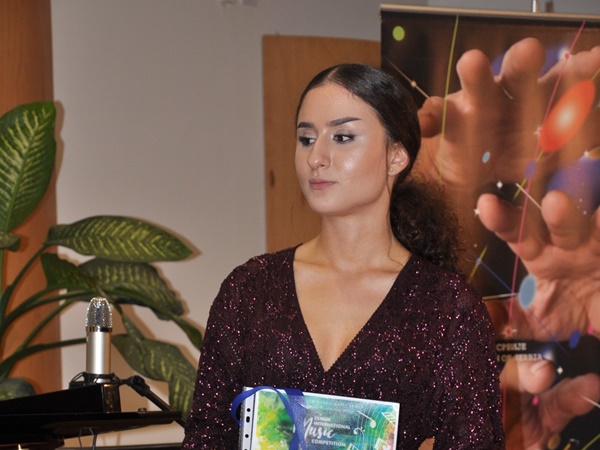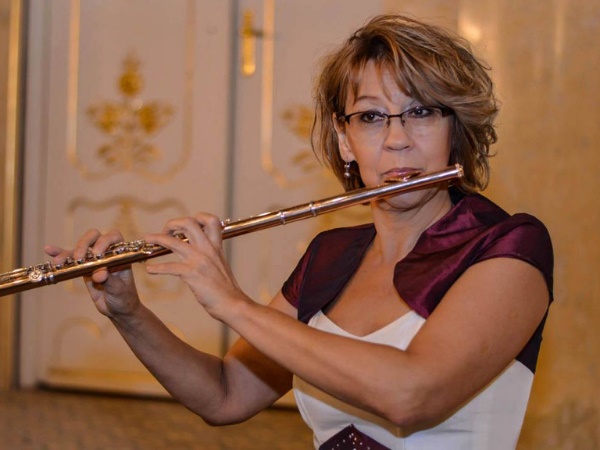MEET OUR LAUREATES - ANDRIJANA PANTIĆ

Dear friends of ZIMC, we present to you Andrijana Pantić, LAUREATE of the competition in the discipline WIND INSTRUMENTS and the winner of the award for the best performance of a Serbian author in the discipline WIND INSTRUMENTS. Below you can read the interview with Andrijana Pantić and her professor Laura Levai-Aksin.
Andrijana Pantić is a third year student of basic academic studies of the flute at the Academy of Arts in Novi Sad, in the class of full professor Laura Levai-Aksin. Here is how our conversation went:
How did your musical journey begin?
Andrijana: I come from a musical family, which was an important factor in my decision to pursue music. I grew up with the sounds of clarinet and saxophone, so I was always attracted to wind instruments. So I decided to enroll in the elementary music school in Loznica in the flute department. I finished elementary music school in the class of prof. Eme Mirčetić.
Do you go to Loznica often, and how inspired are you by the city where you were born?
Andrijana: I try to go whenever I have the opportunity, that is, when my obligations allow it. I am quite inspired by the place where I made my first steps as a flutist and I always gladly return to it.
At last year's Zemun International Music Competition (ZIMC) you had a wonderful performance, you won the title of LAUREATE of the competition in the discipline WIND INSTRUMENTS as well as the Award for the best performance of a Serbian author in the discipline WIND INSTRUMENTS. What are your impressions after the competition? Are you satisfied with the acoustics provided by the Ceremonial Hall of our school?
Andrijana: I am satisfied with the acoustics of the Ceremonial Hall. I am also satisfied with the entire organization of the competition. It is a great feeling to be a part of this kind of atmosphere and a differently conceived competition.
ZIMC is unique in that it insists that an integral part of each competition program consists of at least one composition by a Serbian author. What is your opinion about that, which local composer fascinates you and presents the biggest challenge?
Andrijana: When it comes to the competition program, I think that the idea of ZIMC is fantastic. Unfortunately, not enough attention is being paid to the works of domestic authors. This is a great opportunity to promote and perform compositions that are not often part of the competition program. We really have a lot of local composers who deserve to have their works performed more often. I would like to single out Miroslav Štatkić, whose work for the flute especially inspires me, and whose work I performed at last year's competition.
We look forward to your concert as a ZIMC laureate. How do you prepare the repertoire, what will the Zemun concert look like?
Andrijana: The idea for the Zemun concert is for the repertoire to be somewhat different from the usual flutist repertoire.
You have achieved a large number of notable results in competitions for young artists, as well as concert performances. Could you single out what determined you the most as an artist?
Andrijana: It is difficult for me to single out anything concrete. All my performances and results so far have influenced me to a greater or lesser extent.
When it comes to concerts, what especially inspires you in your expectations for this year?
Andrijana: The previously mentioned repertoire inspires me the most. I want to present and convey to the audience something new, different arrangements of famous works.
Many young artists have shown that classical music can live in unusual places and affiliate with other genres. How do you comment on the new stamp of the young generation in the time of the flood of bad music trends?
Andrijana: Everyone emphasizes the qualities they have, or at least what they consider qualities. I support combining and experimenting with genres and new elements, as long as music is the main focus. The performances themselves, followed by trends, define the audience, and not only the performers of that type.
What other art is close to you?
Andrijana: Literature, right after music.

Interview with Laura Levai-Aksin, full professor of flute at the Academy of Arts in Novi Sad. Here is how our conversation went:
You come from a family of artists. You have performed abroad for a long time, in prestigious halls and concert halls. As an artist, it can be said that you have achieved in the full sense. What is the method of work on which you were raised to achieve high goals? Do you apply that in your pedagogical work?
Laura Levai-Aksin: My father was a clarinetist and he was also my professor at the lower and secondary music school in Subotica. He graduated from the Faculty of Music Art in the class of profesor Bruno Bruno, however, at that time it was a common occurrence, especially in smaller communities, that due to the lack of staff, professors taught other instruments in addition to the instrument for which they were trained. So my father taught the flute in addition to the clarinet, and his first student was my older sister. He regularly attended seminars for flutists in Hungary and the former country of Yugoslavia.
Yes, I have had many appearances abroad as a soloist, member of chamber ensembles and orchestras. I think that versatility is a very important segment in the life of artists, performers, pedagogues. That is one of the things I recommend to my students. But the first thing that is most important to me, along with talent, is work ethic and the way I work and exercise. The goal is the main points of attention and practicum, how to practice. It is very important for students to learn to practice well, be disciplined and smart from the very beginning. I really appreciate my colleagues who work in music schools and their work with small children, beginners, as their task is by no means simple. Dozens of things need to be set up, repeated, corrected, and that is really very specific for small children.
It is difficult to say anything more about the method of work, such as dedication, discipline, self-criticism, studiousness, perfectionism, ambition, creativity, motivation….
In addition to great performances, you also stand out with exceptional pedagogical results. Also, many composers have dedicated their works to you. What is the most important lesson you want to share with your students?
Laura Levai-Aksin: I have excellent students in the class. They are very hard working, thoughtful, responsible and well informed. When you have such students, it is easy and nice to work with them and prepare them for performances and competitions. Most of them are special talents, and holders of high awards even before they enrolled in the Academy.
I must also mention my two exceptional teaching associates - Dr. Petar Popović, senior professional associate and piano associate Filip Milisavljević, independent professional associate who have a large share in our pedagogical results.
Yes, a large number of compositions are dedicated to me. I would not cite the names of the composers as I might omit someone. It is a wonderful feeling when someone dedicates a composition to you, when you inspire someone and deserve to have someone dedicate a work for you, it is a special connection between composer and performer.
The most important lesson for students? To be good and honest people. I work with students individually. I see that I work with them not only as flutists but as colleagues. To learn to value themselves, to respect their own and other people's work and time. To work on themselves and invest in themselves. To be curious. And the answer can be two great sayings, a well known Chinese proverb - "Teachers open the door, you enter by yourself. ” And the second is Einstein's: "The supreme art of teachers is to awaken joy in creative knowledge and expression."
Andrijana fascinated us all with her performance at ZIMC. Please share with us your experiences working with her.
Laura Levai-Aksin: I met Andrijana when she was 8 years old. My former student profesor Emma Mirčetić called me and said "Professor, I have an amazing girl in the class, you have to hear her!" She was adorable, with beautiful long curly hair, incredibly talented and musical.
I followed her progress, successes in competitions and performances. She enrolled in high school in Novi Sad with profesor Ksenija Mijatović, who is also a former student of mine. She finished high school in 3 years and enrolled at the Academy of Arts in Novi Sad. Immediately in her first year, she won the award in the "B" category at the International Competition "Anton Eberst". She will surely tell you in detail about her further successes.
Working with Andriana is great. She always comes smiling at class. She sees the class as a performance. She is always more than ready, technically extremely skilful, has a wonderful color palette, incredible dynamic possibilities, nuance, phrasing, perception, charisma, fantastic energy, control, concentration, memory, etc. She has all the qualities at a very high professional level.
How do you see the role of young musicians' competitions in their professional formation?
Laura Levai-Aksin: Competitions are a very important segment in the development and advancement of young musicians. It is motivation for them, a catapult for further work and improvement, as well as expanding the repertoire. If the results are not as expected - you should not allow failure to weaken you but to strengthen you.
Can art music be closer to the audience today, to the ordinary world? For example, in the United States, artists have an obligation to visit schools and even kindergartens when they visit a city .
Laura Levai-Aksin: I think it's a matter of education, tradition, mentality, marketing. It is necessary to get used to children and teach them to listen to and love art music from an early age. Good examples of such education of children in our environment are, for example, in the Serbian National Theater in Novi Sad ballet play "The Nutcracker" which is shown every year in December, and for several days in a row, is always sold out, the hall is full of children with parents and organized kindergarten and lower primary school groups. Mozart's "Magic Flute" in an abbreviated and adapted version for children is also very popular and visited. The Vojvodina Symphony Orchestra often performs Prokofiev's "Peter and the Wolf" at children's concerts.
Last year, Rita Kinka and I played several "mini-concerts" in Novi Sad with short popular compositions by Bach, Beethoven, Mussorgsky, Bartok, Debussy, Piazzola and other composers for our youngest fellow citizens. Their reaction was incredibly positive. In May, Rita and I will play 4 more such concerts.
What do you currently see as your biggest challenge in dealing with music and music pedagogy?
Laura Levai-Aksin: My whole life is connected with music. I was born and raised in a musical family. My husband is a musician, professor of trombone at the Academy of Arts in Novi Sad. I have a flutist, trumpet player, conductor in my family, we have a lot of friends who are musicians. My private and professional lives are closely connected. In my opinion, often even the smallest and simplest thing, regardless of whether it is about music or profession or private life, can be a great challenge.



